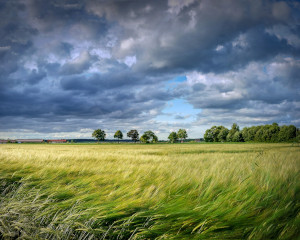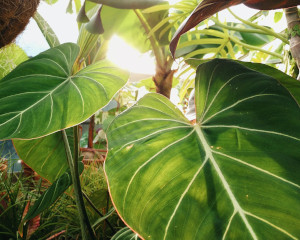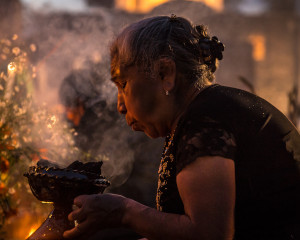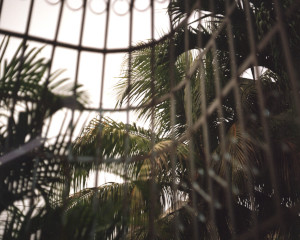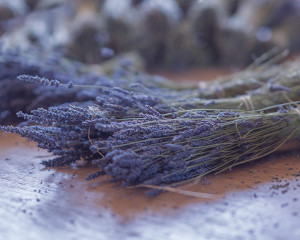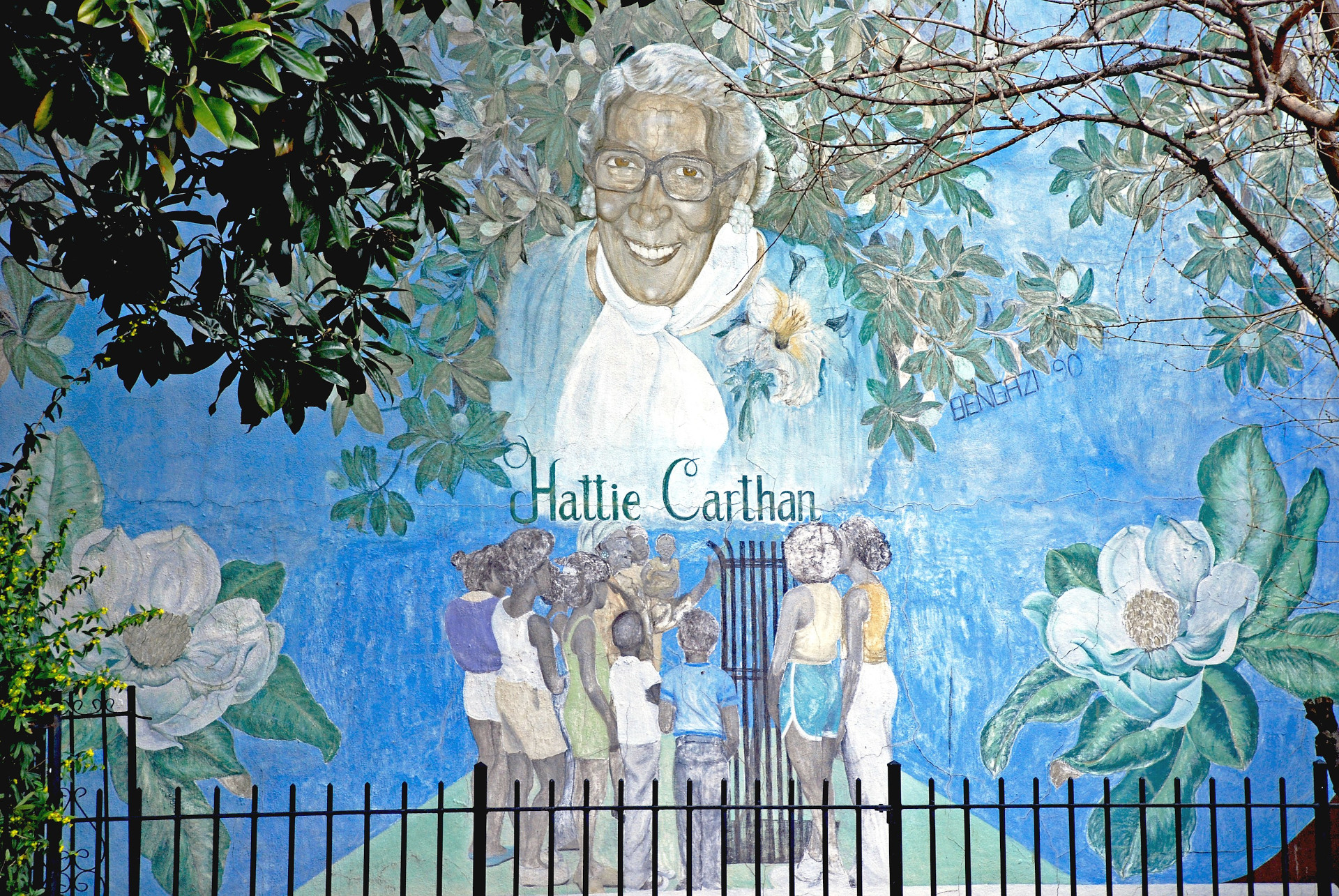
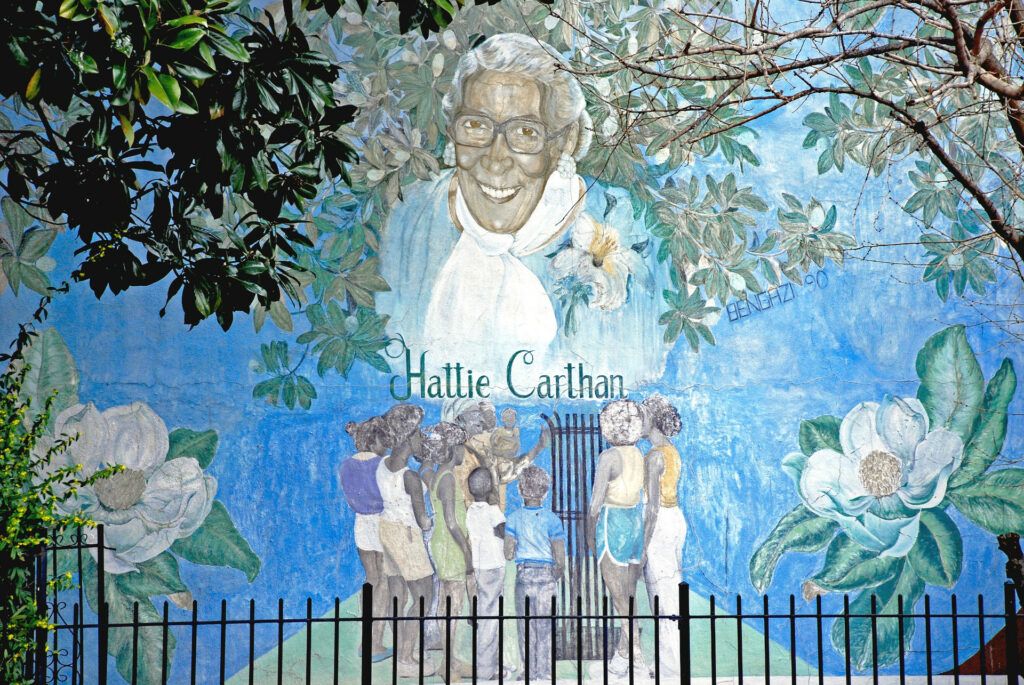
A mural in Brooklyn depicting Hattie Carthan, the environmental activist for whom the
Hattie Carthan Community Garden is named. Infonerd~enwiki CC BY-SA 4.0
Human Hungers:
In Conversation with Farmer Yon of The Hattie Carthan Community Garden
By Annie Stowe Mickum
Sign up for our monthly newsletter!
One summer morning, I made my way through New York City’s historic Bed-Stuy to the Hattie Carthan Community Garden Farmer’s Market. Having never been before, I was instantly welcomed in by the sway of a figure dancing in an apron, and a voice beckoning me to come eat with her. She introduced herself as Farmer Yon as she prepared small plates of fermented vegetables, roasted corn peppered with cinnamon – potent potions for digestion that jostled my body awake and filled me with a sense that I was in the presence of not only a chef, but an artist. She danced as she cooked, inciting a similar bob and sway in my own torso as I sat, smiled, and drank in the medicine of her food and company. “Food is my path,” she told me.
On her days off from the farm, artist and organizer Yonnette, or “Farmer Yon” as she’s otherwise known in her community, spends time taking care of herself. Upon inquiring as to what such an undertaking requires, she simply replies, “what humans need to do to continue,” with a bright, knowing laugh crackling through the phone.
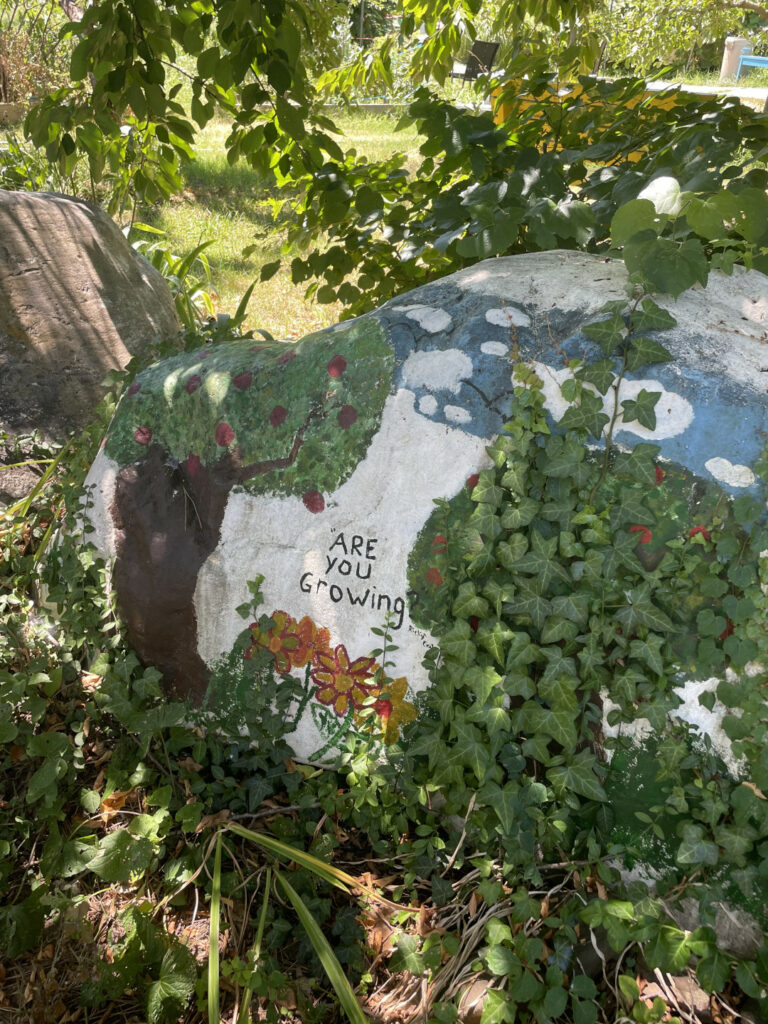
“Today that I’m actually tasting food… I’m able to craft a beautiful tomato basil salad and drink the vinegar at the end. It’s days like these that I’m able to even dream of things like today… it’s that in-between time where I can swing on the bridge of my inner psyche. I can just dream a little.” Dreams play a leading role in what Farmer Yon brings to the outer world. It’s a chance to connect, play, dance, and sing – a prelude to the life she builds out from the Farm, her kitchen, into Bed-Stuy, and far beyond. “Everything I live is a dream, you know, life is like a dream… one of the dreams that I dreamt [was] a deeper understanding of food, because really, we are food to the earth in some ways. So, understanding the depth of food, and then everything that’s coming out of the earth, the farm… the healing. It’s a lot of other realms, you know? As a farmer, you put a seed in and then a lot of that is contained in another realm, and then there’s the gestation, and then it comes… life is like a meaningful dream, or decoding a dream.”
I ask Farmer Yon if food feels like a way of germinating the seeds for those dreams, and she rightfully points me toward the larger implications, powers, and forms of food. “These are limiting words, because there are all these different types of food too, that I’m involved in. Like the music, you know? It’s all one system…” she pauses, and restates, “I’m involved in a lot of different forms of food.” Farmer Yon was sharing her understanding, and with that came her experiences with plants and the planet which could not be teased apart from one another. Farmer Yon’s life, and path, as she stated, was food, but I had not arrived to the conversation with an appreciation for all that food is and can be.
She continued, “Well, you know, like humans – humans require more than foods of plants…so, I’m involved in also helping humans to understand their other hungers. It’s more than just eating… there’s human hunger for acknowledgement, human hunger for meaning of life, for a meaningful life… humans hunger for various things, and they’re all related.” Farmer Yon pauses, and continues after a deep sigh. “Food is sometimes breath for me, and how I share it with others is breath. Food is sound, food is dance. Food is connecting to one another and hugs and nourishment and acknowledgement – and food is community.”
I ask her about how plant communities and the human community acknowledge and relate to each other, from the Hattie Carthan Garden and out past the boundaries of Brooklyn. “They all really do dance together, if you understand how to make them dance. Sometimes we fracture the dance and we try to control the dance and all of that, but they all do dance together, and they all are broadcasting so much. They are all art – they’re all symphony in harmony, and everything is being shown in front of your face… like the way that the seasons and the elements move, and all of our organisms and our fungi. It’s quite a beautiful, meaningful dance, if you’re paying attention.”
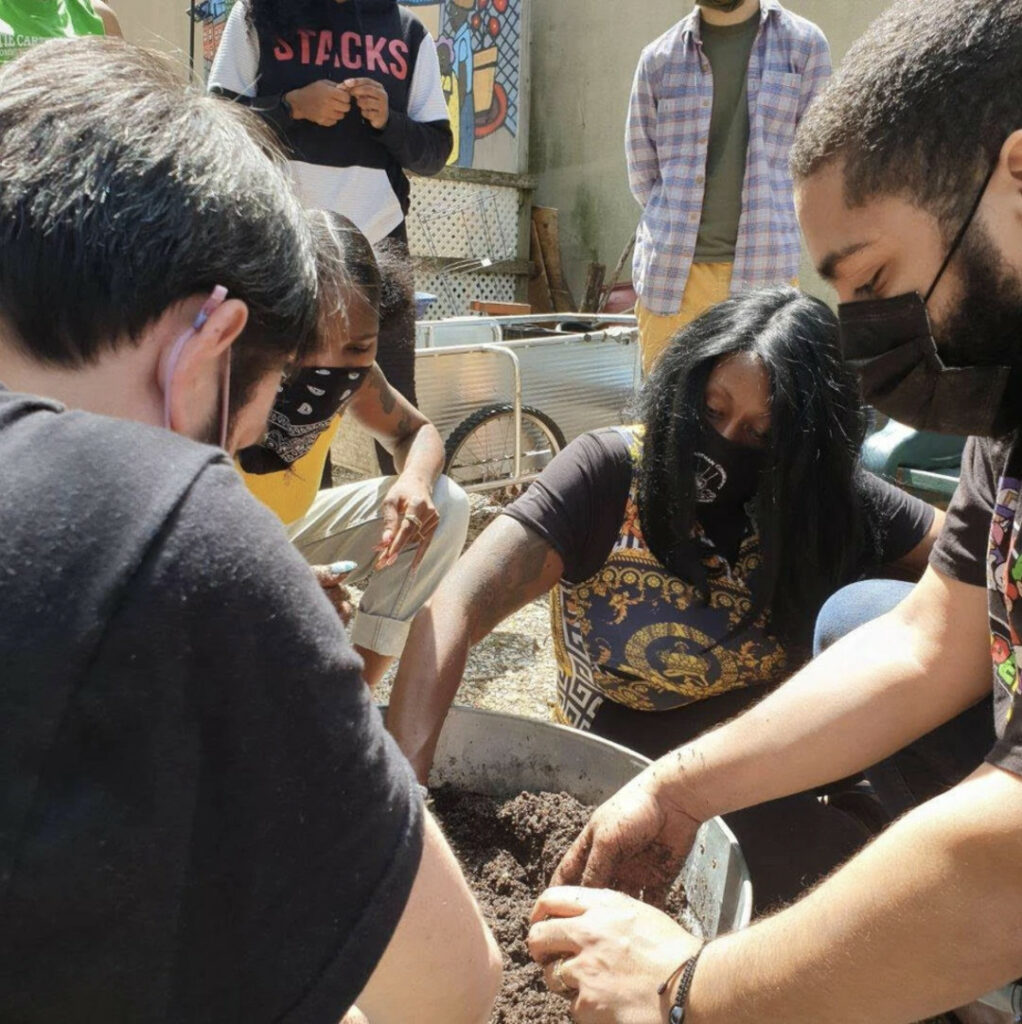
Farmer Yon was born and raised in Guyana, a country on the northern mainland of South America with a tropical and subtropical biome of forests and fields. She recalls, “I’ve listened to spirit all my life. My first memories are always of spirit. My memories are of spending long periods of time with trees and going into the remote areas of the land and having those experiences that I knew were really real. It’s always been that way. So, for the most part, I’ve mostly been trying to keep up with the people, and pretending to be normal for the people, but always being keenly aware of the elements and spirit – that is my story.”
While the majority of her life has been lived in the US, immigrating to the states at sixteen, she describes herself as “not overly patriotic to anything, or loyal to anything other than the earth.” After earning her degrees and a career in the financial sector, 9/11 brought about a life-changing shift, as it did for so many in the city and world at large. “I went back and I reskilled myself. I did plant and sound medicine. I did every single sort of study that you could…. I kind of rebuilt myself, based on what was true, you know what I mean? Like what my natural tendencies are. So there it was…. And I’d moved into Bed-Stuy.” In the midst of this re-centering process, a process which continues to this day, she found herself drawn to the Hattie Carthan Community Garden, which she would frequently pass on her walks, dreaming of the life and path ahead of her. On why the Farm spoke to her, Farmer Yon stated, “I had seen a number of spaces, and this one particular space that I got overjoyed with was a space that had some kind of being trees in the back. I noticed that perhaps my life work and this intersection… it was a match spiritually… in a number of ways.”
How did this relationship to plants on the Farm meet Farmer Yon’s spiritual hunger? She answers, “The whole lifestyle that I created affords me the privilege of listening to plants. I love them all – every plant, even the poisonous ones, I’m intrigued by their stories. I just really love them all… I carry a very intense feeling towards the plants.” Diving deeper into the deep-rooted wisdom each plant carries, and what we have to learn from them. “I love the apoptogenic herbs. I’m intrigued by the fact that no matter what you need, they can find it… . I’ve been learning about the plants that live in the sea, and I’ve been intrigued by the comparison to the ones that live on the earth. I’ve been tincturing with the plants that live in the sea. I am so fascinated by their abilities with oxygenation in the human body, et cetera. That’s been happening for me this year. It’s a deeper opening in my relationship to the ocean.”
We speak about our love for water, for oceans and rivers, how they too so often represent knowledge, wisdom, and the passage of that understanding through time. Farmer Yon speaks about how her love for the plants, and how her medicine with food has been enriched by her time by the sea. “This new opening with the water has been bearing fruits of wisdom… not knowledge, but wisdom. It has been opening in terms of how I craft the medicines, even attuning energy. Understanding precision and healing. I’m healing with my food, and I’m moving through the body with all sorts of tastes. So, I’m able to move down to your liver, move down, move off through your body while we’re eating together and we’re tasting. And then by the time we come back up it’s like a full release. Based on my precision to move into your gastric system and move back up into the center of yourself. That’s advanced – so that is opening, based on the relationship with the water and the water plants.”
Farmer Yon has an awe and adoration for the world around her and the lives within it. She articulates how growing food is a vital dynamic to understanding justice, freedom, and liberation – tenants of the Hattie Carthan Community Garden, and the ethos with which all its members care for the land and its inhabitants, human and otherwise. “Freedom is what we are seeking,” she says. “Freedom within the complexity of oppression and hell… it’s the beauty of life and the mystery of life, I believe, that keeps us living and exploring and growing.”
The Hattie Carthan Community Garden and Farm is beacon for Bed-Stuy community, creating a space for those like Farmer Yon to learn, grow, share, and continue their lifecycle alongside the earth and plants. “From the first day I walked on the land, I know my human age, I know what a human lifespan looks like, I am aware. I am aware that what I am building is a template, or a seed. Something that is going to gestate and birth… and I am aware that what I am building is connected to the future, because I am the future.”
Annie Stowe Mickum is a Virginia-born, Brooklyn-based music publicist & oral historian. A passionate listener, she hopes her words help preserve the voices of communities and the storytellers within them.
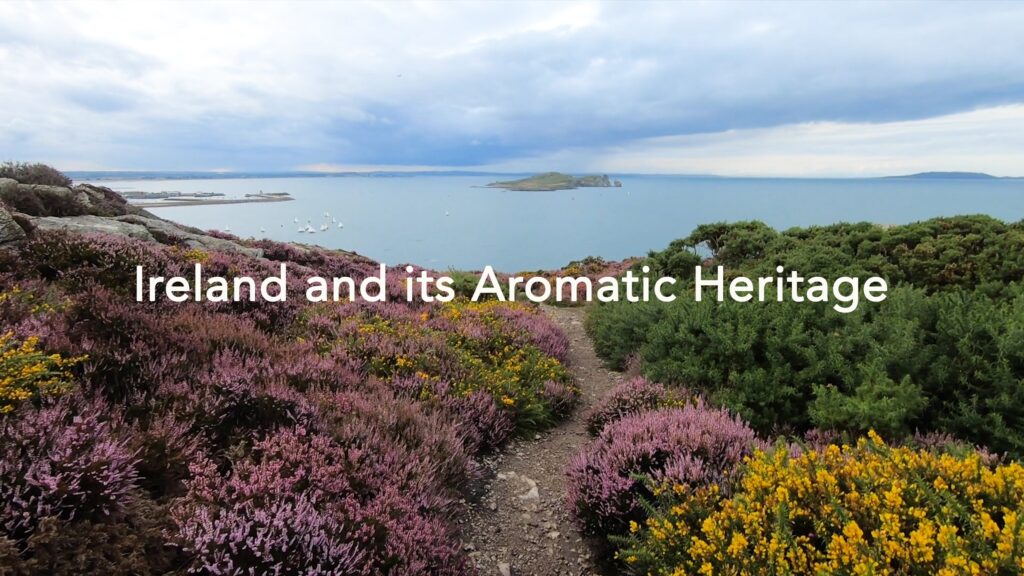
As Ireland transitions from the rich, smoky scent of peat-burning to a more sustainable future, its olfactory heritage is evolving. What will become the next iconic aromatic symbol of Ireland?
Click to watch the documentary trailer.

